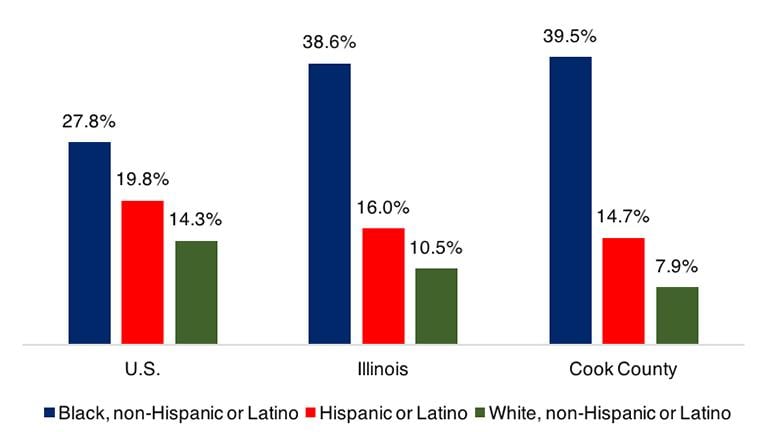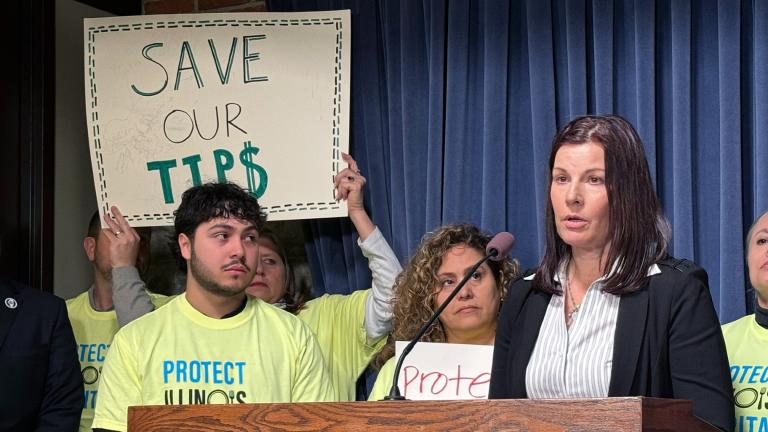Nothing stops a bullet like a job.
That's the title of a hearing that Cook County Commissioners held today, highlighting the results of a new report on youth joblessness in Cook County. That report shows the county leads the nation in white youth employment as well as black youth joblessness.
The report comes from the Great Cities Institute at the University of Illinois at Chicago, and the hearing was held by the Workforce, Housing and Community Development Committee.
Taking a look at 16- to 24-year-olds of all ethnicities throughout Cook County, it found that almost 30 percent of blacks are neither working or in school, compared to just over 12 percent of Latino youth and merely 7 percent of white youth.
The report also explains in which suburbs and community areas unemployment and disengagement are at the highest.
The map below is Cook County, and the darkest colors, on the South and West Sides, represent the worst disengagement at 40 to 50 percent for youths ages 20 to 24 in the year 2014.

“Not only are the numbers so much higher in the black community and also the Latino community, but when you take that map of where the unemployment is the highest, and you overlay it, that’s where the violence is the highest,” said Bridget Gainer, Cook County Commissioner. “So, this is something that involves everybody. But it gets back to that issue, that most people get jobs because they know somebody. They get a job from their parent’s company or their neighbor’s company, but that is why we have such a responsibility for young people who aren’t in that network situation, to bring the jobs to them.”
Though the report shows that unemployment isn't quite as bad for Latino youth as for black youth, Teresa Cordova, director of the Great Cities Institute, notes we still have to consider the quality of jobs those young people have.
“Even though they may have higher rates of employment, their concentration in certain industries – in occupations and industries – and their income level shows us that they actually constitute a working poor,” said Cordova. “So that further analysis of all this data really is important for us, to not only look at providing people access to employment, but providing people access to good employment; good employment that will bring them living wages, good employment that will provide them opportunities to excel within their jobs, for example.”
Increasing youth employment

There was some discussion about the importance of federal investment in youth employment and job training. There was testimony today that federal funding was slashed by hundreds of millions of dollars over the 1990s, and youth employment overall dropped 19 percent between the late ‘90s and the early 2010s.
The report starts with calling for an investment in summer employment, increasing job training, criminal justice reform and changing policies that prevent employment because of a criminal record.
 Document: Read the UIC Great Cities Report
Report authors also point to corporate, government and union apprenticeships and the like, even small business incubators in the neighborhoods where unemployment for young people is at the worst.
Document: Read the UIC Great Cities Report
Report authors also point to corporate, government and union apprenticeships and the like, even small business incubators in the neighborhoods where unemployment for young people is at the worst.
One of those young people was at the board meeting today. James Dixon, 24, from Englewood, explained that any and all of these changes could still be helpful to him.
“I needed help with my resume and cover letter, just because I didn’t know anything about those things,” Dixon said. “Nobody that I knew that was close to me technically went to college and got through it successfully, so those things, it just wasn’t right next door. I’ve experienced homelessness as well as having a criminal background and also just financially because when you’re looking for a job, when you’re going to the interviews and you’re going to the orientation, that money has to come from somewhere.”
James says he's been offered five jobs in the last month, but lost them all after his background check returned with his criminal record, which he says includes two misdemeanors.
But he's hopeful that he'll have good news tomorrow, when he's expecting to learn whether he's received a job opportunity he's interviewed for.
Related stories from 'Chicago Tonight'
 Report Highlights Struggles in Chicago's Segregated Communities
Report Highlights Struggles in Chicago's Segregated Communities
March 14: This year marks the 100th anniversary of the start of the Great Migration, but a new report from the Chicago Urban League says many blacks still live in racially segregated and impoverished neighborhoods.
Study: Slow Thinking Reduces Crime in Chicago
Feb. 23: It sounds like a simple idea: slow down and make better choices. Most of us don't do that as well as we could, but researchers are studying how the simple act of slowing down can reduce crime.
 ‘Rocket Docket’ Sends Low-Level Jail Inmates Home
‘Rocket Docket’ Sends Low-Level Jail Inmates Home
Feb. 11: The Cook County Sheriff's Office is finding a way to keep certain criminal defendants at home and on the job, instead of in jail while they await trial. A look at how a two-year pilot program designed to release inmates jailed for low-level offenses is working so far.







